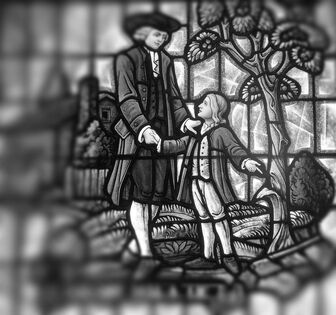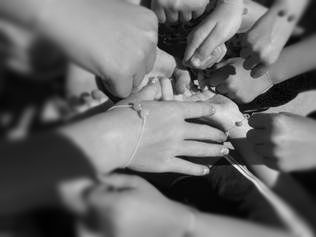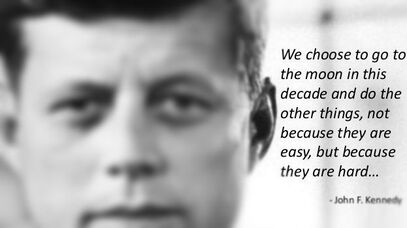History is never relevant. I'll never use History in my lifetime!
 Stained Glass Display at George Washington's Mount Vernon
Stained Glass Display at George Washington's Mount Vernon - Don't just tell them it matters: teach them why and how it matters to them. For years, teachers from elementary school to graduate schools have focused on the events without making connections to the lives of their students. I've written about context and connections in previous articles, but this time let's address the idea that sometimes you just have to clearly tell them. I'm tired of the claims of ignorance, but I also understand that sometimes people need a kick in the seat (That's figurative language: don't actually kick anyone.). That is to say, we have to explicitly teach some things. Not that our lessons should begin in a way where we just state everything up front, but at some point, we must be clear. Sometimes we have to guide students by the hand and show them where the directional signs are. Sometimes we have to read the signs to them. Sometimes we have to explain the signs. You get the idea. Why does it matter that Hamilton and Burr couldn't resolve their differences except by dueling? Why did Billy and Tommy get into a fight on the slide? The answers to such questions might be similar.
- Don't forget the romance. There is something rewarding about a good moral story based on the nation's founding. There is something wonderful about having history heroes. The classic story is the Parson Weems' telling of George Washington chopping down his father's favorite cherry tree with his new birthday hatchet. When asked about it, the story says that George told his father, "I cannot tell a lie," and admitted to being the assassin. The story has a moral and easily fits into a communication arts lesson, as well. Likewise, anything we know about Sacagawea accurately leading Lewis and Clark fits into a romantic notion of a woman saving the directionless men and heroically saving the lives of expedition members. We can all get a picture in our minds of this brave Indian "princess" standing at the pinnacle of a rock, with the wind in her dark hair, and declaring which path to follow. It makes for an admirable picture of a woman in history. That said, read on.
- Kill the romance! We know things were not perfect. We know the people weren't perfect. The future will never benefit from lying about reality. The cherry tree tale a nice story, and it may have happened, but there is no proof. I still cover the story in my classroom, but I also reveal it as probable fiction - at least until someone finds a reference to the event in a letter penned by Augustus Washington or remembered in one of his son George's memoirs. After all these years, it may be one of the only things parents and grandparents "know" about Washington, so at this point it would be better to show kids how to better discern truth and fiction. I don't think there is anything wrong with elevating heroic people, but not to the point that we don't understand that they were just as flawed as we are. Washington bravely and strategically led the Colonial Army during the Revolution, but he also had his share of bad decisions. These people who have been memorialized statues never intended to be worshipped as idols or gods, but at the same time, the monuments are created as a reminder that amidst the mistakes, some great choices were enacted.
 Imagine Respect's Potential
Imagine Respect's Potential - Connect! Not relevant? You have to be kidding! The very births of major religions are much older than American history, and yet those personal beliefs have steered the direction of nations for centuries. Entire peoples have been conquered and slaughtered in the Crusades or Jihad. For years, slaves have been collected by Muslims and accepted by Christians. It happened. It's history. It was and is wrong, but it happened. And it is something to understand. We don't get how something so heinous could have occurred until we understand the timeline of events, the cultural norms of the times, and the excuses that people used. And after generation upon generation of accepting slavery as the standard, it is a pattern that we are still dealing with. That hatred is emblazoned and engraved into the hearts of many of our own citizens to this day. It helps to understand the history so we can connect our students to the reality of choices that they, too, must make. At the same time, we need to bring it onto the level of our children. True, they don't have to make a decision whether to own slaves, today, but continued lessons about the equal treatment and respect of other human beings, regardless or race, color, gender, or creed is something for which to strive.
- Here comes Growth Mindset again. Yes, I've covered growth mindset in previous posts, as well, but I don't think it can be overemphasized. People - students - can change. With all of the evil we see in the world, and all the behavioral patterns we see in our classrooms, we must not lose sight that people can change. As teachers, we want to positively affect the world, but it's easy to give up, lose heart, and get depressed. Why? Because it takes a lot of time and energy to turn a big ship around, and there are icebergs in our paths. We're going to continually hit the icebergs, with all the unseen issues our students carry under the surface. We're going to continually fire all of our boilers around the clock to correct courses. We'll go home tired. We'll cry into our pillows. We will pray to God, throwing up our hands in despair. But the ship can be navigated around the blockades, through the icy waters, and the ship can arrive safely on the other side. Why? Because we know that people change. How do we know? Because we have countless examples in the people we study in history.








































